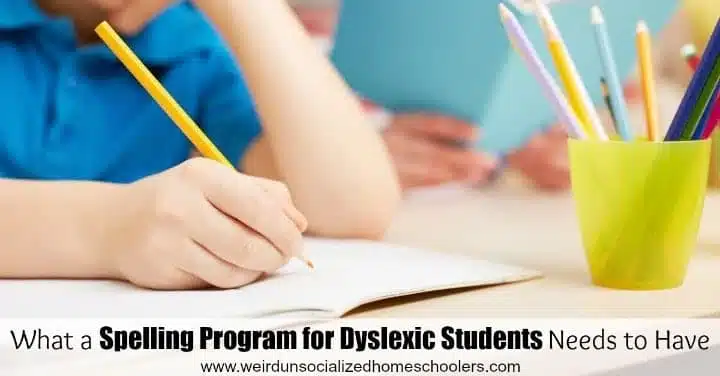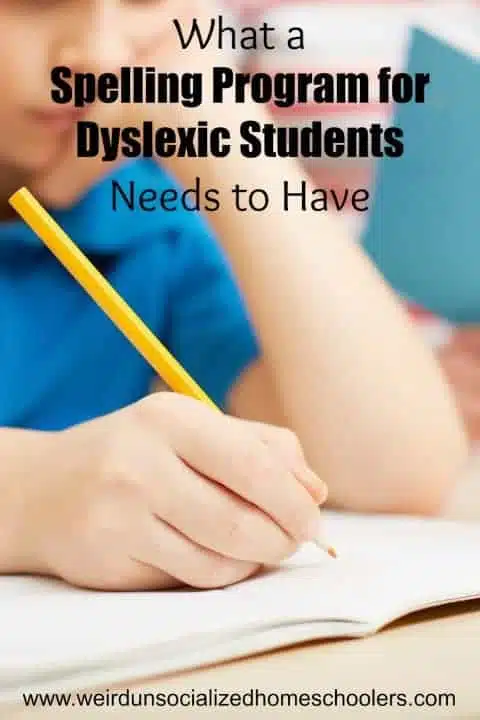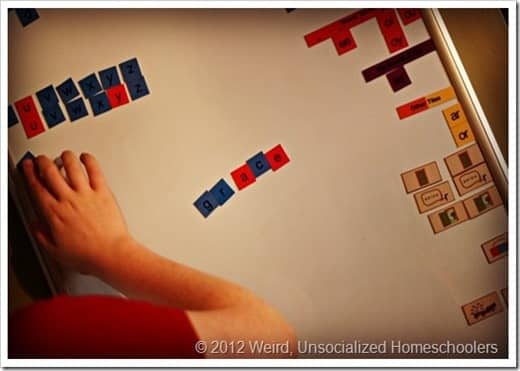What to Look for in a Spelling Program for Dyslexic Students
When you hear the word dyslexia, you likely envision kids who struggle to read. However, poor spelling marks another hallmark of the learning challenge. You can’t cure dyslexia, but with the right tools, kids can overcome many of its challenges. One of those challenges is poor spelling.

What Should a Spelling Program for Dyslexic Students Include?
If your child has dyslexia, you may not know what to look for in homeschool spelling curriculum. A comprehensive spelling program for dyslexic kids should:
Be Orton-Gillingham based
A systematic approach to reading instruction, Orton-Gillingham was developed in the early 1930’s by Samuel Orton and Anna Gillingham. Orton was a neuropsychiatrist and Gillingham an educator and psychiatrist.
Highly effective with dyslexics, the principals of this language-based, multisensory reading approach also apply to spelling.
Present spelling concepts in a logical order
Teaching spelling concepts in a logical, sequential order is essential for dyslexic kids. An effective spelling program must help them break words down into meaningful chunks.
The Orton-Gillingham approach achieves this by introducing “sound symbols” (consonants, vowels, and blends) in a sequence that makes sense. It presents individual sounds first, followed by syllables, then, roots, suffixes, and prefixes.
Build phonological awareness
Spelling curriculum for dyslexic kids must start with phonological awareness. If a student doesn’t know the sounds that each letter makes and can’t hear them or break them down into syllables, he can’t spell the word. He must be able to decode the sounds in the words he hears to encode those sounds on paper.
Teach word patterns.
The spelling program should group words by similar patterns instead of presenting an unrelated list of words to memorize. Dyslexics tend to rely heavily on memorization, which can be detrimental in the long run.
Patterns and the reasoning behind them, along with predictable spelling rules help kids learn how to spell. They can apply that knowledge to unfamiliar words, instead of relying on memorized lists.
Because all words don’t follow spelling rules and patterns, an effective spelling program should also include those words that students must commit to memory.
Be mastery-based.
Students with dyslexia benefit from a mastery-based program that offers lots of built-in review. It should allow flexible pacing that allows a student to focus on each concept until he fully understands it.
An effective mastery-based program will also avoid teaching difficult, confusing, or similar concepts side by side. Instead, it will introduce one and allow the student to master it. Then, it will offer review when addressing the new similar or confusing rules.
For example, a student may learn to double a consonant when adding vowel suffixes. He will review that rule when he learns to drop the final silent e when adding vowel suffixes.
Be multisensory
A good spelling curriculum uses as many pathways to a student’s brain as possible. Kids should be able to see words written out, hear the sounds of each letter or syllable, and manipulate (touch, move, write) the letters and syllables of those words.
The more pathways information takes to get to the brain – the more senses used in taking in the information – the better it is retained.
If a child has dysgraphia or struggles with the physical act of handwriting, forcing him to write out spelling words may prove counterproductive. Instead, use tiles, magnetic letters, or typing (with spell check turned off) to allow him to focus on spelling.
Teach word origins
Students don’t need to know only how to spell words, but the reasons behind the spelling. Knowing that the ph spelling for the /f/ sound likely indicates a Greek origin helps a child figure out both the spelling and meaning of a word. I read a fascinating article about why some kids can’t spell that touches on this and other problems with standard spelling tests.

Spelling doesn’t have to remain challenging for dyslexic kids. Choosing a homeschool spelling curriculum designed with them in mind can give them the tools and confidence to be proficient spellers.
If you suspect your child may have dyslexia, I strongly encourage you to use the free online dyslexia screener from Lexercise. Combining Lexerise and a spelling program designed with dyslexic kids in mind helped my dyslexic learner become a successful reader and speller.
updated from an article originally published March 25, 2014
This post is linked to the Hip Homeschool Hop.
Kris Bales is a newly-retired homeschool mom and the quirky, Christ-following, painfully honest founder (and former owner) of Weird, Unsocialized Homeschoolers. She has a pretty serious addiction to sweet tea and Words with Friends. Kris and her husband of over 30 years are parents to three amazing homeschool grads. They share their home with three dogs, two cats, a ball python, a bearded dragon, and seven birds.





Thanks for hosting! This week I’ve shared “How to Tackle March like an Irishwoman” — in other words, make a nice Irish Stew. This recipe uses Brussels Sprouts! 🙂
Have a wonderful week!
~ Christine
I tried All About Spelling for my son. Too many pieces, cards for him.Drove him crazy. He did not retain any of it. I have all the stuff, even the tote:O( We use Sequential Spelling and for the first time he is spelling better. Obviously it will always be a struggle ,but for him to spell “would” or even something commonplace as “does” , really is amazing. I also had him doing Reading Horizons( Orton -Gillingham based) which includes spelling. I love Lexercise. Thanks
I also tried All About Spelling with my Dyslexic son and it WAS way too many pieces (and really boring for me as the teacher). Thanks for listing what is working for you. Maybe I will try some of those you suggested 🙂
Love these links. Although none of mine were dyslexic we have had some different learning struggles. When my oldest was young these would have been awesome. Particularly the multisensory one. Thank you for hosting us all. 🙂